As the Spring Festival draws near, Desheng Youliang Village in Nuanshui Township, Jungar Banner in Ordos City of north China’s Inner Mongolia Autonomous Region enters a new round of apple sales. In the 2,000 cubic meters of cold storage facility, workers are busy picking, packing, and loading.
Pisha sandstone, known as the "cancer of the earth," covers more than half of the area of Jungar Banner. The development of traditional agriculture here was once considered challenging. However, things turned around from the 1990s onward, after local villagers successfully planted and grew the first apple seedlings. In just a couple of decades, the apple industry has now become a major business for local economy.
Apple Orchards on Soft Rocks
Pisha sandstone is a kind of soft rock in the semiarid region along the upper and middle reaches of the Yellow River and is severely eroded by wind and rainfall, before being carried into the Yellow River. The Pisha sandstone region in Jungar Banner once suffered the most severe water loss and soil erosion in the world.
In 2009, due to the poor living environment, the local government relocated Nuanshui Village which was badly impacted by exposed Pisha sandstone. Those migrants relocated to the Juxin community, not far from the township government. However, it was difficult to carry out agricultural and husbandry production in this area, and the lack of livelihood posed a new challenge to the villagers.
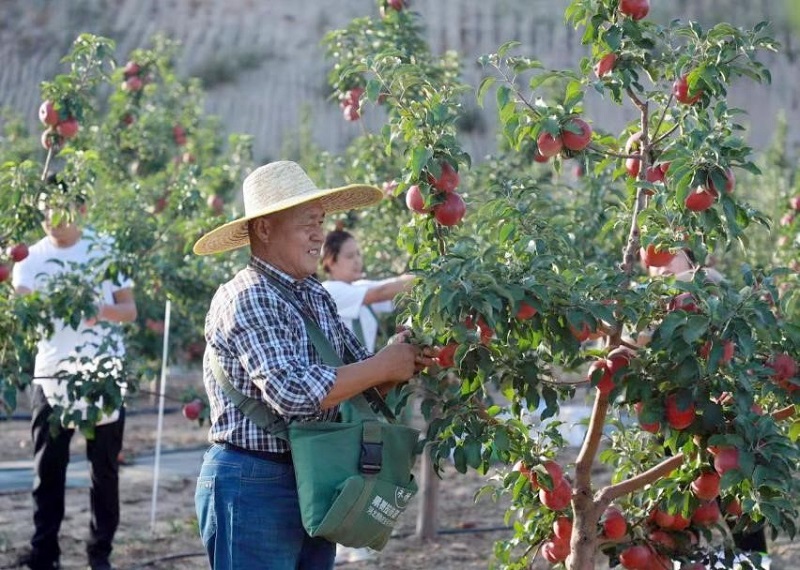
Hua Shengming picks apples in the orchard. Photos by Yu Xiangjun
In 2015, Hua Shengming, Party branch secretary of Desheng Youliang Village, was inspired by the success of local villagers planting apple seedlings on Pisha sandstone in the 1990s, and therefore took the lead in "growing apples on cancer rocks."
"The rock was so hard that we couldn't use shovels, so we dug pits in the cracks between rocks with pickaxes," Hua Shengming told China Today. "From selecting seeds, planting seedlings, filling soil, watering, hoeing weeds, and fertilizing — every step had to be trialed multiple times." To their surprise, the land between hills in Desheng Youliang Village contained loose soil, and Pisha sandstones are retentive, airy, and high in trace minerals. The area also receives long hours of sunlight throughout the year and has a huge variation in daily temperature. These natural conditions are ideal for apple growing.
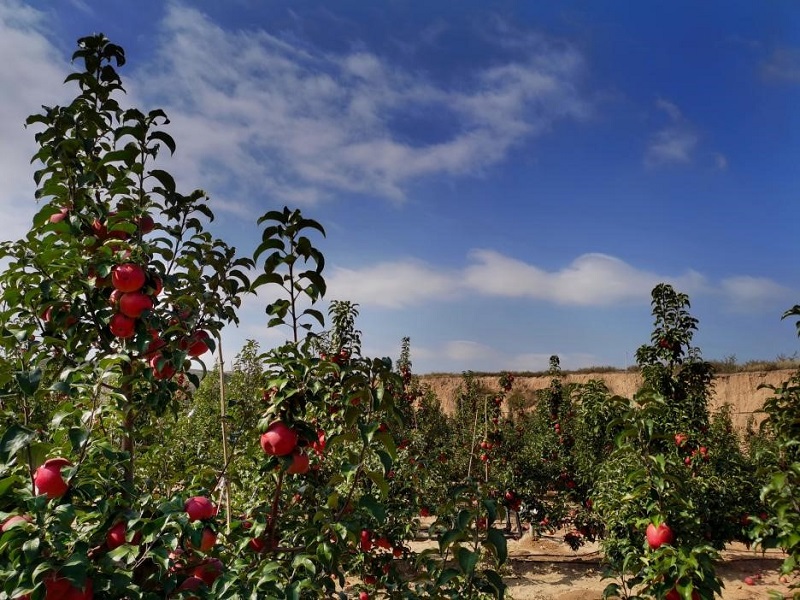
A span of trees are laden with apples in an orchard in Nuanshui Township.
In 2015, villagers began to plant apple trees, and the planting area kept expanding with the increasing survival rate of apple seedlings. In the meantime, the local government in Jungar Banner provided assistance such as technical support, road construction, and access to utilities such as water, gas, and electricity to help the local apple industry develop. Due to these efforts and measures, now the area of apple trees for commercial purpose has reached around 153 hectares.
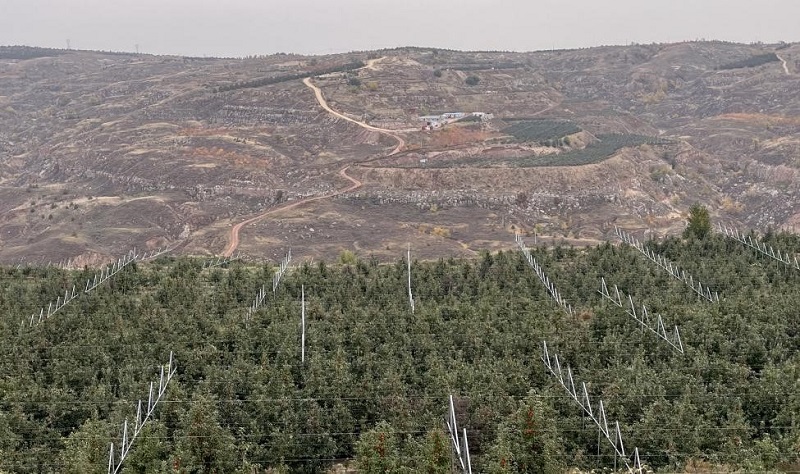
The barren field beside the orchard is the unmodified Pisha sandstone.
“Our apples are juicy, sweet, and have an intense fruity flavor,” said Hua. The unique texture of Nuanshui Township’s apple is captivating for consumers.
Apple forests can retain sand, prevent soil erosion, and purify the air, fundamentally reversing the fragile ecological conditions in Nuanshui. “The sustainable apple industry has become the best solution for local ecological protection and restoration," said Wang Long, head of Nuanshui Township.
Apple Trees Become “Gold” Trees
Hua Shengming is an apple tree grower who operates one of the largest apple orchards in Nuanshui. His orchard expanded from approximately 2.7 hectares in 2015 to around 6.7 hectares today, netting him increased income. "My orchard generates around RMB 1.4 million in revenue a year, with a net profit of RMB 900,000," Hua said.
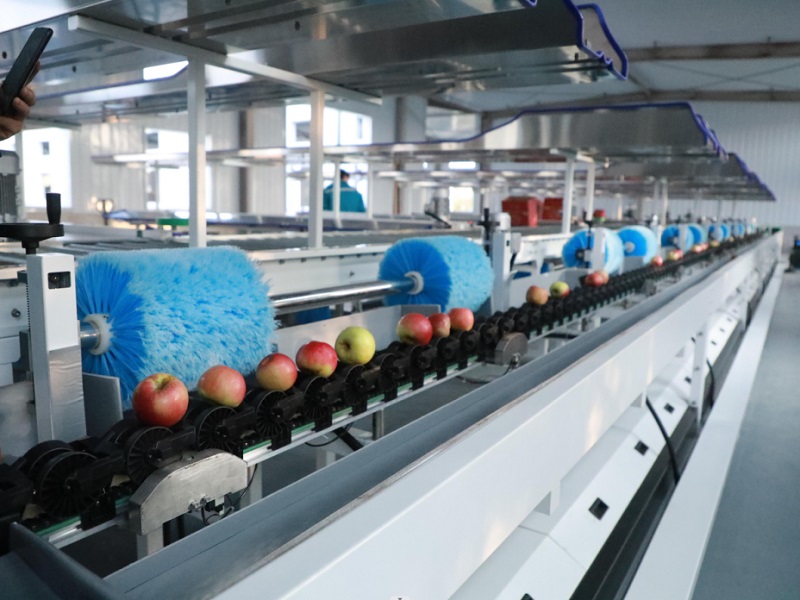
Apples are being cleaned on an automated machine before packaging.
In addition to Hua Shengming, more and more villagers in Desheng Youliang Village are getting rich from planting fruit trees. In 2019, with the support of the township government, 82 fruit farmers in Desheng Youliang Village jointly set up a cooperative and decided to develop a 10-hectare orchard, with 25 percent of the net profit allocated to the land contractors, and 75 percent dedicated to the village's public welfare and the its collective economic development.
Today, the apple industry has become a pillar industry in Nuanshui. Over 20 varieties of apple trees are grown, producing up to five million kilos of fruit annually generating over RMB 80 million in revenues and around RMB 3 million for the village’s collective income.
In order to increase its share in the apple market, Desheng Youiang Village has had its 153 hectares of orchards certified as green food and gotten the brand name "Nuanshui Mountain" used by apple growers in the region approved, becoming the first regional brand of apples originating from western Inner Mongolia Autonomous Region.
"Ecological Forests" Become "Industrial Forests"
From planting to storage and processing to sales, the apple industry in Nuanshui is becoming specialized and market-oriented.
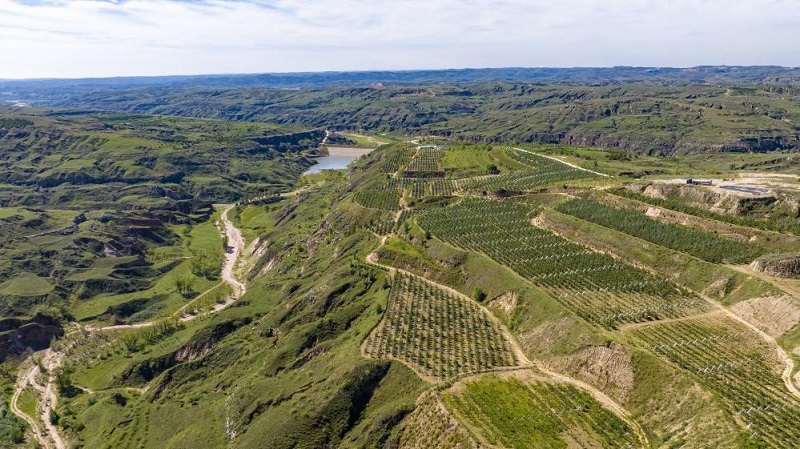
An aerial view of the apple orchards on the hills in Nuanshui Township.
In order to cultivate apples of better quality, the local government is scaling up orchard production by introducing new cultivation patterns, adding new varieties, and adopting other solutions. It also invites technical personnel to give lectures to growers on planting, pruning, pest control, mulching, and other technical knowledge concerning tree care at different stages.
"In the past, the villagers relied on old methods and past experience of growing apple trees. A large number of growers have emerged now equipped with modern technology and new management skills after professional training in forestry and fruit knowledge," Party secretary of Desheng Youliang Village Zhao Yongjun said.
To create greater value of its apple industry, Nuanshui is extending its industrial chain while continuing to expand its share in the market. It built a production and processing line and a fully automated filling line capable of processing 750,000 kilos of apple vinegar and drinks annually, aiming to improve the added value of the apple; it also built a cold storage facility that is able to store 400,000 kilos of apples to prolong the apples’ shelf life. E-commerce platforms have also been utilized to sell apples in the larger market.
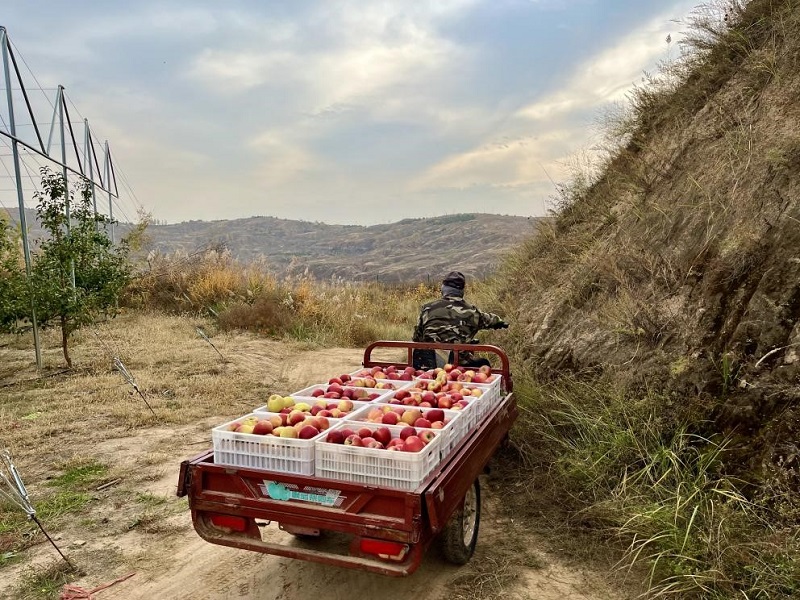
Freshly-picked apples are being transported to be processed and packaged.
In addition to these efforts, the local government has also cooperated with China Agricultural University to create a digitalized smart apple orchard base. "In the future, with the real-time data scrolling on the screen, growers will be able to find out in real-time the conditions in the orchard such as the lack of water and fertilizer running low. Digital means will help the orchard further improve quality and efficiency." Zhao Yongjun told China Today.
In addition to apple trees, Nuanshui Township has also planted apricot trees, pine trees, seaberries, and other ecological forests. It has 13,333 hectares of planted seaberry forest, and 1,867 hectares of apricot forest. Those forests growing on the Pisha sandstone are becoming Nuanshui’s "green bank," enriching local residents.